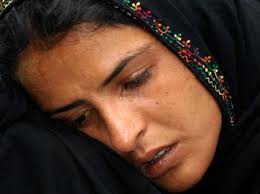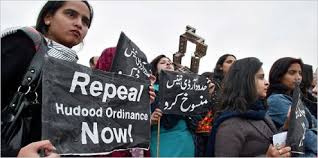In March 2012, the Deepsea Challenger made a manned descent to the deepest known part of the ocean, the Challenger Deep in the Mariana Trench.
What they found at 35,700 feet was a world under such pressure and so lacking in light that it made the conditions of life difficult to imagine.
What light there was came entirely from the fish themselves. Their bioluminescence could be for mating, but just as often it was for predation.
When I listened to refugee claims from certain parts of the world, I was reminded of that world of pressure and darkness and how, often, the only light there came from predators.
We’ve been studying the divine qualities. I’d like to illustrate some of the dark qualities of life in these areas. This should illustrate the work that lies ahead of us to create Nova Earth, a world that works for everyone.
In Afghanistan, a woman who was forced into marriage, was beaten and runs away has committed a “moral” crime that can see her end up in prison. The crime is “attempted zina.” “Zina” is sex outside marriage. Human Rights Watch says:
“Human Rights Watch has estimated that 95 percent of girls and 50 percent of women imprisoned in Afghanistan had been accused or convicted of ‘moral crimes,’ such as zina. Often, the only evidence in these cases was that the women or girls had ‘run away’ from home either to escape domestic violence or an illegal forced marriage, and were then charged with ‘attempted zina,’ a crime that does not exist in Afghan law.” (1)
“These moral crimes usually involve flight from unlawful forced marriages or domestic violence.” (2)
There is no need for evidence in such a matter. The woman who flees a forced marriage where there is rape and other forms of violence is assumed to have committed zina by fleeing the household.
“Women and girls who have run away are often presumed by police and prosecutors to be guilty of sex outside of marriage solely because they are outside of the supervision of their male relatives.” (3)
When “adultery” occurs, and adultery could mean a man and a woman found talking together, the man is assumed to have been seduced by the woman and the woman is usually the one stoned.
If the family she flees considers that their honor has been impugned, they may kill her. Such an act is designated an “honor” killing. Article 398 of the Afghan Penal Code states that “a person who carries out an honor killing ‘is exempted for punishment for murder,’ and may be imprisoned for no more than two years.” (4)
Here is a multiple honor killing in Baluchistan, which a legislator publicly justified:
“In one case in 2008, five women were shot and buried alive by members of their own tribe after three of them refused to get married as their families had demanded. Israrullah Zehri, a senator from Balochistan province, publicly defended the killings as ’tribal custom.’” (5)
The pattern of behaviour here is blaming the victim. The woman is married off against her wishes and desires and beaten or raped. She flees and is imprisoned. If they presume that their honor has been affected, they may kill her and such an act is not considered murder and draws only a short sentence if it is prosecuted at all.
Moreover, “a proposed provision in the criminal law that would bar relatives of the accused from testifying in court.”
“This would make it extremely difficult if not impossible to prosecute domestic violence, child marriage, and other domestic abuses against women, since it’s almost only family members who witness this type of abuse.” (6)
When a case is brought to court, if by chance a conviction is won, it’s soon overturned as in the case of 13-year-old victim of forced marriage and brutality Sahar Gul.
“The court reversed the 10-year sentences handed down to the in-laws who brutally abused 13-year-old bride Sahar Gul in a case that had previously been seen as emblematic of the positive impact of EVAW [the Elimination of Violence Against Women law].” (7)
Women can be handed over as a means of settling a dispute:
“[Baluchi] Legislator, Hazar Khan Bijrani, stands accused of presiding over a tribal jirga (council) that in 2006 ordered the handing-over of five girls, aged six and younger, as ‘compensation’ in a dispute.” (8)
This is a common practice in some parts of Afghanistan as well:
“[In] isolated areas, traditional dispute resolution can be very dangerous for women. It is already widely practiced and routinely involves ‘settlements’ harmful to women, including the use of baad (providing women or girls as compensation for a crime or civil dispute, including in rape cases) and honor killings.” (9)
I’ve read many stories, in my years of studying the human-rights literature, of women who have been raped and afterwards are forced to marry their rapists.
This is very much a closed society, ruled by men. Not many people would be aware of domestic violence or rape. In forbidding relatives of the accused from testifying in court, the legislators are nullifying the only source of testimony and guaranteeing immunity from prosecution.
Thus the persecutors are aided and the victims penalized.
This situation is widespread in Afghanistan:
“In 2008, research by Global Rights showed (PDF) that 87 percent of a sample of Afghan women reported that they had faced at least one form of abuse in their lifetime, 39 percent said they had been hit by their husband in the last year and 59 percent said they were in forced marriages.” (10)

Mukhtar Mai was sentenced by a local Pakistani council to be gang-raped. At the risk of her life, she fought back and established the truth.
When President Hamid Karzai goes to appoint members to the country’s human rights commission, he appoints “unqualified new commissioners, including a former Taliban government official who urged repeal of EVAW. A committee including representatives of key government institutions prepared a draft law that would have reinstated stoning as a punishment for adultery. (11)
In Afghanistan, local government in the form of a loya jirga or in Pakistan, local government in the form of a panchayat can sentence a woman to be raped. Mukhtar Mai was the victim of such a travesty of justice.
Mukhtar was sentenced by a local panchayat to be gang-raped for a crime she did not commit. She refused to be silenced and some of her rapists were brought to trial, only to be subsequently released. Her frustrated wait for justice is fairly typical.
“On March 15, four of the five men convicted in the Mukhtar Mai rape case, but later acquitted by the Multan bench of the Lahore High Court, were released by Central jail authorities only to be re-arrested on March 18 on the intervention of Prime Minister Shaukat Aziz. Meanwhile, nearly three years after she was raped by four ‘volunteers’ on the order of a village panchayat, Mukhtar Mai still awaits justice.” (12)
In 2005, the head of the Pakistani government, General Pervez Musharaf, publicly dismissed women’s allegations of rape:
“In fall 2005 General Musharaf of Pakistan spoke dismissively of the claims of Pakistani women, saying that many of them make false or exaggerated claims of rape in order to get financial support and visas from foreigners. He likened rape to a ‘money-making thing’: if you want to go abroad.
“He did so despite the publicity surrounding Mukhtar Mai who was raped – an act of honor revenge – at the orders of a village jurga in 2002; and despite the threats against Shazia Khalid’s life after she went public about her rape. Pakistani feminists were outraged and demonstrated in the street to make their counter-statement. (13)
This situation is not one that happens only in Afghanistan and Pakistan. It is common in many parts of the globe.
“Over half a million girls and women were raped in the 1994 Rwandan genocide. Tens of thousands of girls and women have been raped in Bosnia, Sierra Leone and East Timor.” (14)
We could add most African subsaharan countries to the list, much of South and Southeast Asia, and the list could go on.
Finally, a woman’s rape is looked upon as having shamed her and her family. Raped women are often not permitted to rejoin their families. It’s often hoped that they’ll commit suicide and save the family embarrassment.
“In many of these countries, as in Serbia and Pakistan, a raped woman will be shunned by her community, and suicide is often thought to be her only avenue of escape. Despite this stigma and shaming, in Sierra Leone the scale of war rape was so massive that rape survivors were welcomed back into their communities despite all else.” (15)
“Despite all else.”
How are we to penetrate the darkness and relieve the pressure of such an ingrained, persecutory way of life in so many parts of the world?
And this is just a look into one area of life that women face. In many areas of the world, a woman’s life is fraught with peril at every turn and state protection (police, judges and prison officials) is either virtually useless or else part of the net of persecution.
Such is the darkness left on the planet today and we lightworkers are tasked with reclaiming and restoring life for both victim and perpetrator.
Footnotes
(1) “Afghanistan: End ‘Moral Crimes’ Prosecutions,” Human Rights Watch, June 24, 2014, at https://www.hrw.org/news/2014/06/23/afghanistan-end-moral-crimes-prosecutions.
(2) “Human Rights Council: Adoption of the UPR Outcome in Afghanistan,” June 19, 2014, at https://www.hrw.org/news/2014/06/19/human-rights-council-adoption-upr-outcome-afghanistan.
(3) “Afghanistan: End ‘Moral Crimes’ Prosecutions,” ibid.
(4) Loc. cit.
(5) Human Rights Watch, World Report 2009 (New York: Human Rights Watch, 2009), Pakistan chapter, https://www.hrw.org/en/world-report/2009/pakistan.
(6) “Dispatches: Donors at Last Speak out for Afghanistan’s Women,” Feb. 19, 2014, at https://www.hrw.org/news/2014/02/19/dispatches-donors-last-speak-out-afghanistan-s-women.
(7) Heather Barr, “Women’s Rights in Afghanistan Must be Steadfastly Respected,” March 20, 2014, at https://www.hrw.org/news/2014/03/20/womens-rights-afghanistan-must-be-steadfastly-respected.
(8) Human Rights Watch, World Report 2009, ibid.
(9) “Afghan Women and Girls: Building the Future of Afghanistan: Testimony of Rachel Reid to the Senate Foreign Relations Committee,” Human Rights Watch, Feb. 24, 2010 at https://www.hrw.org/news/2010/02/24/testimony-rachel-reid-senate-foreign-relations-committee.
(10) Heather Barr, ibid.
(11) Loc. cit.
(12) Ali Dyan Hussan, “The Jurisdiction Dilemma,” HRW, Mar, 22, 2005, at https://www.hrw.org/news/2005/03/20/jurisdiction-dilemma.
(13) Zillah Eisenstein, Sexual Decoys: Gender, Race and War in Imperial Democracy. London: Zed Books, 2007, 29, at https://books.google.ca/books?id=c22VbFCdcdMC&pg=PA29&lpg=PA29&dq=jurga+rape&source=bl&ots=IpqZVw9Uw9&sig=1vPHrdJYp9iKshYgFVeUJScsauY&hl=en&sa=X&ei=W6PaU6KcDqGO8gHO0oCYCw&ved=0CEMQ6AEwBg#v=onepage&q&f=false.
(14) Loc. cit.
(15) Loc. cit.


